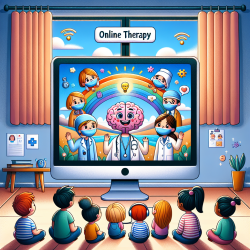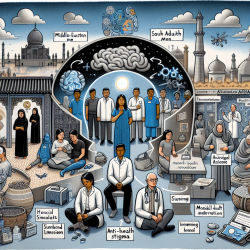Introduction
The COVID-19 pandemic has profoundly affected healthcare systems worldwide, including the mental and physical well-being of healthcare workers. A recent study titled "Impact of the COVID-19 Pandemic on Clinical Schedules and Physical and Mental Well-Being of Gastroenterology Nonphysician Healthcare Workers" provides valuable insights into these impacts. While the study focuses on gastroenterology nonphysician healthcare workers (GI-NPHCWs), its findings offer broader implications that can be applied to improve the delivery of online therapy services, such as those provided by TinyEYE, to schools.
Key Findings from the Study
The study highlights several critical areas affected by the pandemic:
- Work Schedule Disruptions: 85.2% of GI-NPHCWs experienced changes in their work schedules, including reduced hours and reassignment of duties.
- Mental and Physical Health: Over 50% reported worsening pre-existing physical and mental health conditions.
- Personal Protective Equipment (PPE): Inadequate PPE availability was linked to increased mental stress and anxiety.
Applying Research Insights to Online Therapy Services
While the study is specific to GI-NPHCWs, the insights can be adapted to enhance online therapy services for children:
- Flexible Scheduling: Just as healthcare workers faced schedule disruptions, online therapy providers should offer flexible scheduling to accommodate the varying needs of children and schools during the pandemic.
- Mental Health Support: Recognizing the mental health challenges faced by healthcare workers, online therapy services should integrate mental health support for children, addressing anxiety and stress exacerbated by the pandemic.
- Resource Availability: Ensure that therapists have access to necessary resources, including technology and training, to deliver effective online therapy, similar to the need for adequate PPE in healthcare settings.
Encouraging Further Research
The study underscores the importance of ongoing research to understand and mitigate the impacts of the pandemic on various sectors. For practitioners in online therapy, engaging in research can lead to:
- Enhanced Service Delivery: By staying informed about the latest research, practitioners can adopt evidence-based strategies to improve therapy outcomes for children.
- Innovation in Therapy Techniques: Research can inspire new approaches and tools that make online therapy more engaging and effective for young learners.
Conclusion
The COVID-19 pandemic has presented significant challenges across all sectors, including healthcare and education. By leveraging insights from research studies like the one on GI-NPHCWs, online therapy providers can enhance their services, ensuring better outcomes for children. Continued research and adaptation are crucial as we navigate these unprecedented times.
To read the original research paper, please follow this link: Impact of the COVID-19 Pandemic on Clinical Schedules and Physical and Mental Well-Being of Gastroenterology Nonphysician Healthcare Workers.










